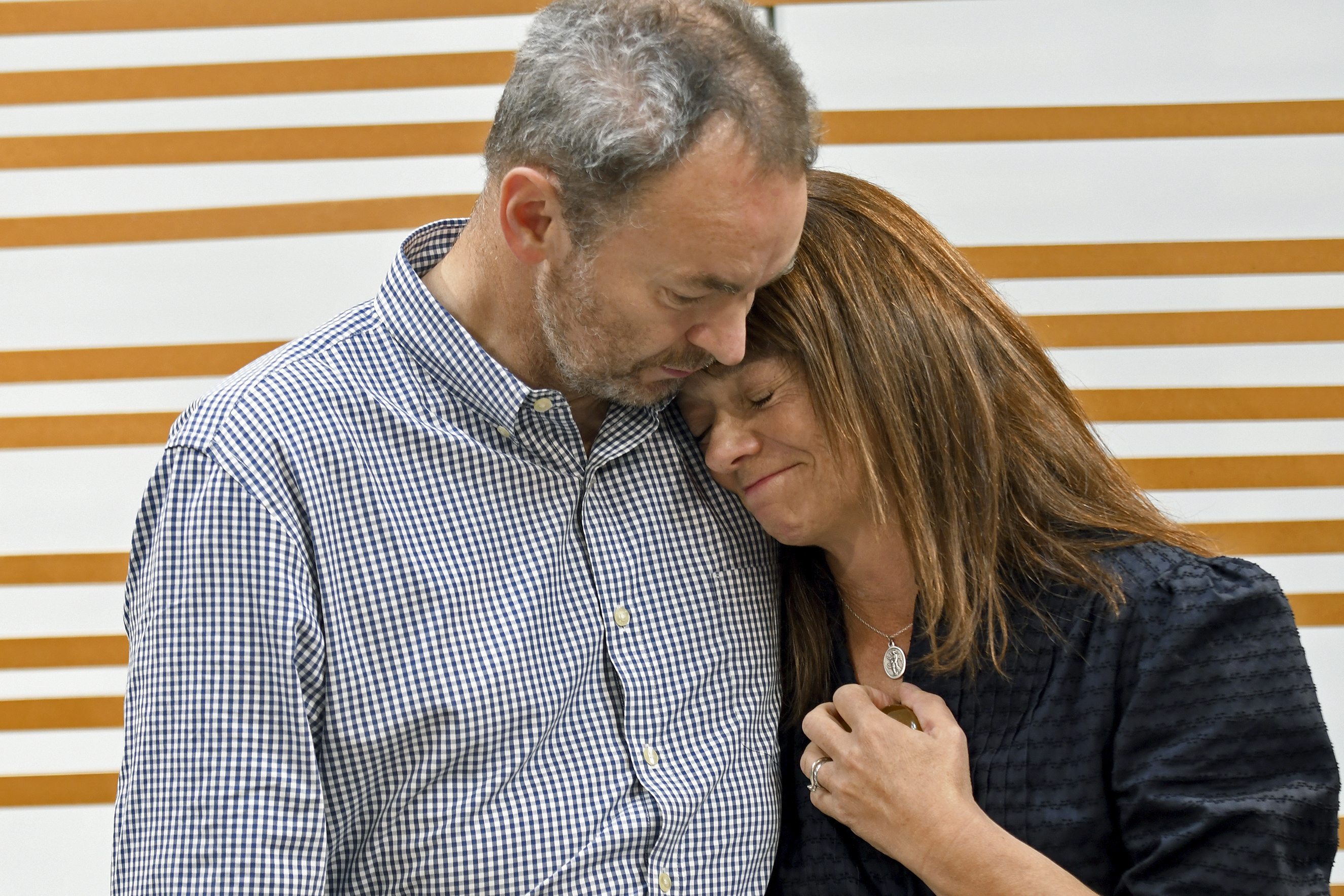The backlash against Syrian refugees after the Paris terrorist attacks was fast -- about two dozen governors have announced that the refugees the United States has agreed to resettle are not welcome in their states.
The Obama administration is admitting at least 10,000 refugees fleeing the war in Syria to the U.S. over the next year, and some Democrats have pushed for an additional 65,000.
But on Sunday and Monday, governors across the country, many of them Republicans, began trying to block any Syrians from coming to their states, saying that they were worried terrorists would sneak in among them.
The United States should not admit any refugees, not even orphans under age 5, Republican presidential hopeful and New Jersey Gov. Chris Christie said in an interview with radio host Hugh Hewitt. He said he did not trust the Obama administration to properly vet them.
“A Syrian ‘refugee’ appears to have been part of the Paris terror attack,” Texas Gov. Greg Abbott wrote in a letter to President Barack Obama saying Texas would not accept any refugees. “American humanitarian compassion can be exploited to expose Americans to similar deadly danger.”
The Islamic State, which is operating in Iraq and Syria, has taken credit for the Friday night attacks in Paris that left 129 people and wounded 352— most at the Bataclan concert hall. A Syrian passport was found near the body of one of the assailants, though a French official could not confirm that the attacker was the passport holder. Greek officials said that the man had crossed into the European Union through the Greek island of Leros in October.
Florida Gov. Rick Scott, in a letter to House Speaker Paul Ryan and House Majority Leader Mitch McConnell, asked Congress to prevent Obama from using any federal money to fund the relocation of 425 refugees to Florida — the number it has been asked to support.
U.S. & World
“(I)t is our understanding that the state does not have the authority to prevent the federal government from funding the relocation of these Syria refugees to Florida even without state support,” he wrote.
A State Department lawyer told NBC News that lawyers were looking into whether it was legal to ban refugees.
Obama pushed back against the governors during a press conference at the conclusion of the G20 summit in Antalya, Turkey.
"The people who are fleeing Syria are the most harmed by terrorism…they are parents, they are children, they are orphans." Obama said. "It is very important that we do not close our hearts to these victims of such violence and somehow start equating the issue of refugees with the issue of terrorism."
The Department of Homeland Security said that refugees were subject to security checks by the State Department, the Department of Homeland Security, the FBI and the intelligence community. All available information is vetted against an array of law enforcement, intelligence and other databases.
“We are aware of recent statements by a few governors regarding the resettlement of Syrian refugees into their states,” it said in a statement. “The administration remains steadfastly committed to the President’s plan to resettle at least 10,000 Syrian refugees in the United States in (fiscal year) 2016. The administration made this decision only after concluding that we can do so safely, consistent with our national security.”
It noted that more than 180 cities and towns across the country were welcoming refugees and said it was confident it could move forward settling refugees safely.
“Our emphasis is on admitting the most vulnerable Syrians -- particularly survivors of violence and torture, those with severe medical conditions, and women and children – in a manner that is consistent with U.S. national security,” it said.
Since the start of the Syrian civil war four years ago, four million refugees have left the country. By September, the U.S. had admitted about 1,500.
Governors who say the Obama administration should stop resettling Syrian refugees in the U.S., in some cases at least until vetting procedures are reviewed, are from Alabama, Arizona, Arkansas, Florida, Georgia, Idaho, Illinois, Indiana, Iowa, Kansas, Louisiana, Maine, Maryland, Massachusetts, Michigan, Mississippi, Nebraska, New Jersey, New Hampshire, New Mexico, North Carolina, North Dakota, Ohio, Oklahoma, South Carolina, Tennessee, Texas and Wisconsin. New Hampshire's Gov. Maggie Hassan is the first Democrat among the group.
As the list of governors trying to block refugees grew, those in Connecticut, Kentucky, Minnesota, Pennsylvania, Vermont and Washington-- Democrats Dan Malloy, Steve Beshear, Mark Dayton, Tom Wolf, Peter Shumlin and Jay Inslee -- took the opposite stand and announced the Syrians continued to be welcome.
In Texas, the executive director of the state's American Civil Liberties Union, said the governor had already deployed troops to the state's more than 1,200-mile southern border to try to stop refugees from South and Central America.
"Now he wants to use taxpayer money to close off the rest of the state’s thousands of miles of border to Syrian refugees, whether they’re flying from New York or driving from Texarkana?" Terri Burke asked. "I would like to know just how he plans to do that. It’s truly baffling."
Refugees and the refugee resettlement program should not be victims of horrible attacks perpetrated by a few individuals, Burke said.
"The bottom line is, refugee admission is a federal matter, reflecting our values as a nation," she said. "Texas and other states don’t have veto power in this area. That’s why it would violate the Constitution for a governor to bar an entire group of refugees from coming into their state because of their nationality."
The Council on American-Islamic Relations denounced the governors' position, saying that they had abandoned American ideals.
"Defeating ISIS involves projecting American ideals to the world," it said. "This un-American rejection of refugees, who will face significant security checks prior to entry, sends entirely the wrong message."
In Michigan, Gov. Rick Snyder said on Sunday that the state was suspending its efforts to resettle refugees until the Department of Homeland Security had reviewed its procedures.
Michigan is home to between 500,000 and 800,000 Arabs and others from the Middle East and Snyder added: “It's also important to remember that these attacks are the efforts of extremists and do not reflect the peaceful ways of people of Middle Eastern descent here and around the world.”
For Majed Moughni, a 45-year-old lawyer in Dearborn, who arrived in the United States as a child, fleeing the civil war in Lebanon, it is important that the United States be cautious, but not exclude particular ethnicities or religions, nor close its doors to refugees.
“We should also not buy into what ISIS wants,” he said. “They do want the war, they do want the intolerance, they do want the hate.”
The United States should allow the Department of Homeland Security to do its job, he said.
“When you single out the Syrians, you’re doing exactly what ISIS wants you to do,” he said.
In announcing that Indiana would suspend its resettlement of additional Syrian refugees, Indiana Gov. Mike Pence asked for assurances from the federal government that proper security measures were being taken.
“Indiana has a long tradition of opening our arms and homes to refugees from around the world but, as governor, my first responsibility is to ensure the safety and security of all Hoosiers,” Pence said.
And in neighboring Illinois, Gov. Bruce Rauner said that the Paris terrorist attacks were a reminder of the security threats facing America.
“We must find a way to balance our tradition as a state welcoming of refugees while ensuring the safety and security of our citizens,” he said. "Therefore, the state of Illinois will temporarily suspend accepting new Syrian refugees and consider all of our legal options pending a full review of our country’s acceptance and security processes by the U.S. Department of Homeland Security.”
Nicole Puglise contributed to this article.



